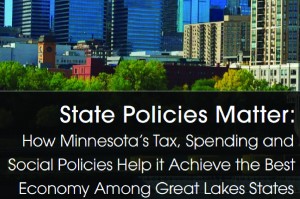Over the last year, I’ve been traveling Michigan and speaking to groups about the need for a new economic agenda for our state, one that puts a good-paying career for![]() all front and center. Such an agenda reflects understanding that in good times and bad far too many Michigan households are experiencing declining or stagnant incomes. Since the turn of the century––no matter who was in control in Lansing and Washington––Michigan has moved from being a high-prosperity to a low-prosperity state.
all front and center. Such an agenda reflects understanding that in good times and bad far too many Michigan households are experiencing declining or stagnant incomes. Since the turn of the century––no matter who was in control in Lansing and Washington––Michigan has moved from being a high-prosperity to a low-prosperity state.
We believe that we need elected leaders who aren’t afraid to talk about the big shifts happening in our economy and how those shifts affect our communities. From our perspective this is what the 2018 Michigan election for Governor and state legislature should be about. How specifically are candidates going to raise household income for all in the context of an economy where the nature of work is being constantly transformed.
We need to find a way to shape the conversation so that candidates in both parties find it hard to offer the same proposals they have been running on for decades that have not worked. Where telling us they have the magic elixir to turn the clock back and recreate a prosperous 20th Century Michigan economy is not acceptable. Where telling us that having some combination of a growing economy, low unemployment and good business climate ratings will lead to a rising standard of living for all is not acceptable. And where not talking about how to pay for improving education and infrastructure––which nearly all candidates tell us they want––is not acceptable.
We know that you are watching elections closely this year, and many of you have asked us how you can leverage our work to elect better leaders. What we would suggest is that you think about the ways you can use our work to help structure the conversation and debate around the economy, so that we build support for candidates in both parties who will commit that:
- Establishing raising household incomes for all will be THE mission of their economic policy;
- Shaping education policy so that ALL kids receive a quality education that builds career “rock climbing” skills;
- Helping Michigan cities and towns to be vibrant places where people want to live and work will be an economic growth priority; and
- Understand that the state will need to pay for these critical public investments.
You may be in media, you might be on the board of a PAC, you might work with an organization that runs candidate forums, you might host fundraising events, or simply make donations. In each of these—and other settings—you can find opportunities to structure conversations so they are about the things that matter to a rising household income for all.
Some questions you might use to shape the conversation are:
- Despite a low unemployment rate and a high business friendly ranking, 40% of Michigan households cannot pay for basic necessities. What changes in state budget and taxation policies do you believe will raise the standard of living of all Michigan citizens?
- Numerous bi-partisan commissions and reports recommend transforming education to develop 21st Century skills––far beyond what is on standardized tests––in all children and invest billions more annually in education from birth through college. What specifically will you do to implement and pay for these recommendations?
- Numerous bi-partisan commissions and reports recommend investing billions more annually for Michigan to have the infrastructure necessary to compete in a 21st Century economy. How would you pay for these recommendations?
- Both metro Detroit and metro Grand Rapids did not make the final 20 list for Amazon’s HQ2 because of the lack of those with a four-year degree or more and poor transit. What specifically will you do so that Michigan is competitive for future high-wage job investment possibilities similar to HQ2?
If you try something with candidates like this let us know what you did and how it went. We need to figure out how to make these kind of questions the focus of the economic policy debate.







